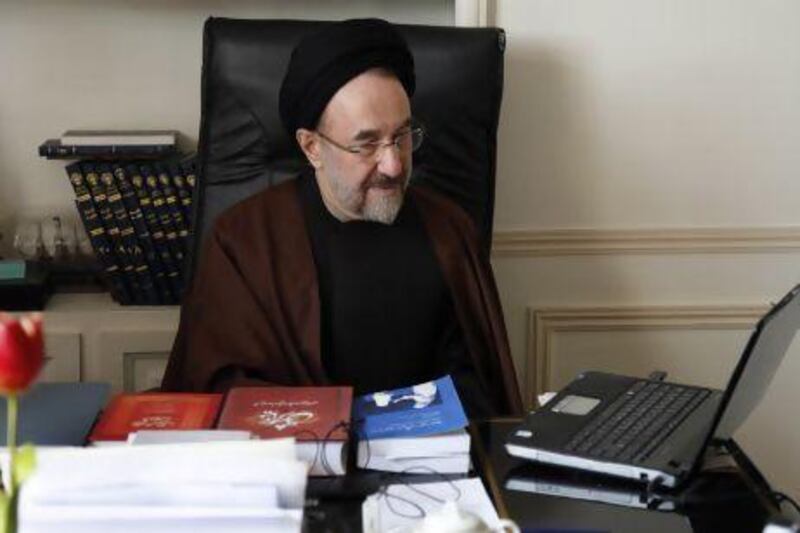He has been dubbed an Iranian Hamlet, a charismatic philosopher-politician who agonises endlessly over momentous decisions.
But now, after weeks of mounting speculation that he would run, Mohammad Khatami, Iran's reformist former president, has seemingly ruled out contesting June's presidential election that will pick a successor to Mahmoud Ahmadinejad.
That will be a heavy blow to many reformists who saw Mr Khatami, 69, a genial, mid-ranking imam, as their only credible hope at the ballot box.
In a speech at the weekend, he made clear he had thought long and hard about his decision, weighing a sense of duty to run against its drawbacks for ordinary Iranians.
"One could consider standing if there was the slightest sign of change, but unfortunately there is no evidence of this," Mr Khatami told Bahar News, a reformist website. Moreover, he said, Iran's ruling hardliners would not allow him to run, and if he opposed them they would make the people pay the price.
"The reality is that they will not allow me to enter the political scene," Mr Khatami told a gathering of veterans from the Iran-Iraq war. "Personally, I will not be able to tolerate the costs that will be imposed on the country and people because of my decision to run."
Iran's supreme leader, Ayatollah Ali Khamenei, has made little secret of the fact that he wants a pliant hardliner to replace Mr Ahmadinejad, his one-time protege, as president.
The country's marginalised, demoralised and fractious reformist movement has been pushing Mr Khatami in opposite directions, both to run and not to run. Those urging him to contest the June 14 vote - who range from political prisoners, former cabinet ministers and religious leaders to ordinary people - are mainly reformists inside the country.
They believe that only by contesting the elections can the reformists stay relevant and maintain some bargaining power within the system now dominated by bickering hardline factions.
Reformists who insist Mr Khatami should not run are mostly more radical figures who moved abroad after the regime crushed mass street protests against Mr Ahmadinejad's "stolen" re-election four years ago.
Urging a boycott of the vote, they said Mr Khatami's candidacy would give legitimacy to the regime and betray those who sacrificed so much in 2009, when scores of pro-democracy activists were killed.
Hundreds more remain behind bars while the two reformist candidates who ran against Mr Ahmadinejad, Mir Hossein Mousavi, 71, and Mehdi Karrubi, 75, have spent the past two years incommunicado under strict house arrest.
In his speech at the weekend, Mr Khatami referred to the plight of Mr Mousavi, who millions of Iranians believe was the real winner of the 2009 election. He re-entered politics after a 20-year absence with a view to rescuing the Islamic establishment, but ended up being accused by ruling hardliners of trying to "topple the system", Mr Khatami said.
He also cited the cases of other political prisoners held on "bizarre pretexts", and denounced what he said was a culture of levelling unfounded charges against the regime's critics.
"They constantly accuse us of espionage for the CIA, Mossad, MI6 and the Soros Foundation. This is while there is no room for the defence. If these accusations are true, put us on trial to clarify the situation," Mr Khatami said.
His supporters believe he remains Iran's most popular politician, a man who tried to liberalise the country politically, socially and economically during tenure between 1997 and 2005, when he also tried to mend fences with the United States.
But Iran's old guard, whose power lay beyond the ballot box, stymied him at every turn, fearing he was an Iranian Gorbachev who would bring about the collapse of a system he was trying to reform.
Although Mr Khatami twice won the presidency by a landslide, the regime in effect forced him to operate as the leader of the opposition. He clearly has little appetite to shoulder the burden of high office again under similar circumstances.
When he was president, the incremental yet significant gains he made were mostly lost on a young, restless and increasingly disillusioned population.
Today, many Iranians view Mr Khatami's eight years in power as a golden era. He oversaw a Tehran spring in which the country enjoyed a significant cultural glasnost and personal rights were expanded.
He was also a staunch supporter of foreign trade and investment, a position many believe is needed to bypass crippling US-led sanctions imposed to curb Iran's controversial nuclear ambitions.
"Today, the biggest concern of many Iranians is not politics but their financial well-being, and many believe things were better under Mr Khatami," said a senior political analyst in Tehran.
Many of Mr Khatami's reformist critics now acknowledge that what they saw as timidity during his presidency was in fact a virtue. He refused to mobilise the immense people power at his disposal in case it led to the spilling of innocent blood. The regime's brutal response to the 2009 uprising seemingly proved him right.
Many Iranians also felt proud of the urbane Mr Khatami on the world stage. He spoke of a "dialogue of civilisations" as he strove to mend fences with the West and reached out to Arab Gulf countries.
By contrast, Mr Ahmadinejad antagonised the West with his rhetoric against Israel, which deepened suspicions of Iran's cherished nuclear programme.
Mr Khatami said at the weekend that during his tenure the international community had recognised Iran's right to peaceful nuclear technology and "we didn't provoke the world".
[ mtheodoulou@thenational.ae ]
twitter: For breaking news from the Gulf, the Middle East and around the globe follow The National World. Follow us





